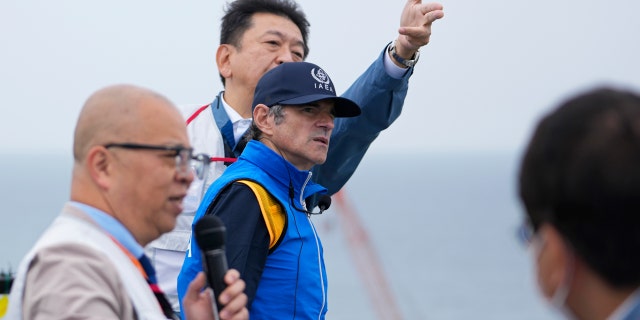- The head of the United Nations’ atomic agency, Rafael Mariano Grossi, conducted a tour of Japan’s Fukushima nuclear power plant on Wednesday and expressed satisfaction with a controversial plan to release treated radioactive wastewater into the Pacific Ocean.
- Grossi observed the facilities where the water will be treated and diluted with seawater before being released 1 kilometer offshore through an undersea tunnel.
- UN leader assured residents that the International Atomic Energy Agency (IAEA) would oversee the discharge to ensure safety and address concerns.
The head of the U.N. atomic agency toured Japan’s tsunami-wrecked Fukushima nuclear power plant on Wednesday and said he is satisfied with still-contentious plans to release treated radioactive wastewater into the Pacific Ocean.
International Atomic Energy Agency chief Rafael Mariano Grossi observed where the treated water will be sent through a pipeline to a coastal facility, where it will be highly diluted with seawater and receive a final test sampling. It will then be released 1,000 yards offshore through an undersea tunnel.
“I was satisfied with what I saw,” Grossi said after his tour of equipment at the plant for the planned discharge, which Japan hopes to begin this summer. “I don’t see any pending issues.”
The wastewater release still faces opposition in and outside Japan.
Earlier Wednesday, Grossi met with local mayors and fishing association leaders and stressed that the IAEA will be present throughout the water discharge, which is expected to last decades, to ensure safety and address residents’ concerns. He said he inaugurated a permanent IAEA office at the plant, showing its long-term commitment.
POLISH CLIMBER DIES SCALING PAKISTAN’S ‘KILLER MOUNTAIN,’ RESCUE EFFORTS UNDERWAY FOR STRANDED MOUNTAINEER
The water discharge is not “some strange plan that has been devised only to be applied here, and sold to you,” Grossi said at the meeting in Iwaki, about 25 miles south of the plant. He said the method is certified by the IAEA and is followed around the world.
The IAEA, in its final report on the Fukushima plan released Tuesday, concluded that the treated wastewater, which will still contain a small amount of radioactivity, will be safer than international standards and its environmental and health impact would be negligible.
Local fishing organizations have rejected the plan because they worry their reputation will be damaged even if their catch isn’t contaminated. It is also opposed by groups in South Korea, China and some Pacific Island nations due to safety concerns and political reasons.
Fukushima’s fisheries association adopted a resolution on June 30 reaffirming its rejection of the plan.
The fishery association chief, Tetsu Nozaki, urged government officials at Wednesday’s meeting “to remember that the treated water plan was pushed forward despite our opposition.”

Rafael Mariano Grossi, Director General of the International Atomic Energy Agency, visits the Fukushima nuclear power plant in northeastern Japan. He listens to Tomoaki Kobayakawa, President of Tokyo Electric Power Co., explain the facilities for releasing treated wastewater.
Grossi is expected to also visit South Korea, New Zealand and the Cook Islands to ease concerns there. He said his intention is to explain what the IAEA, not Japan, is doing to ensure there is no problem.
In an effort to address concerns about fish and the marine environment, Grossi and Tomoaki Kobayakawa, president of the plant operator, Tokyo Electric Power Company Holdings, signed an agreement on a joint project to determine whether they are impacted by tritium, the only radionuclide officials say cannot be removed from the wastewater by treatment.
In South Korea, officials said in a briefing Wednesday that it’s highly unlikely that the released water will have dangerous levels of contamination. They said South Korea plans to tightly screen seafood imported from Japan and that there is no immediate plan to lift the country’s import ban on seafood from the Fukushima region.
Park Ku-yeon, first vice minister of South Korea’s Office for Government Policy Coordination, said Seoul plans to comment on the IAEA findings when it issues the results of the country’s own investigation into the potential effects of the water release, which he said will come soon.
China doubled down on its objections to the release in a statement late Tuesday, saying the IAEA report failed to reflect all views and accusing Japan of treating the Pacific Ocean as a sewer.
HONG KONG DECLARES PURSUIT OF OVERSEAS ACTIVISTS FOR LIFE, IGNITING INTERNATIONAL BACKLASH
“We once again urge the Japanese side to stop its ocean discharge plan, and earnestly dispose of the nuclear-contaminated water in a science-based, safe and transparent manner. If Japan insists on going ahead with the plan, it will have to bear all the consequences arising from this,” the Chinese Foreign Ministry said.
Grossi said Wednesday he is aware of the Chinese position and takes any concern seriously. “China is a very important partner of the IAEA and we are in close contact,” he said.
A massive earthquake and tsunami on March 11, 2011, destroyed the Fukushima Daiichi plant’s cooling systems, causing three reactors to melt and contaminating their cooling water, which has leaked continuously. The water is collected, treated and stored in about 1,000 tanks, which will reach their capacity in early 2024.
The government and TEPCO, the plant operator, say the water must be removed to prevent any accidental leaks and make room for the plant’s decommissioning.
Japanese regulators finished their final safety inspection last week, and TEPCO is expected to receive a permit within days to release the water.
Prime Minister Fumio Kishida, after meeting with Grossi, said Japan will continue to provide “detailed explanations based on scientific evidence with a high degree of transparency both domestically and internationally.”
Read More: World News | Entertainment News | Celeb News
